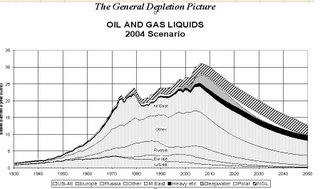Petroleum and Natural Gas WatchVol. 5, Number 3
August 31, 2006
by Michael Vickerman, RENEW Wisconsin
One of the hazards involved in energy analysis is placing too much emphasis on raw data, like the kind one finds in the U.S. Energy Information Agency’s weekly and monthly reports. While rawness may be a desirable attribute in certain meats and vegetables, it is less desirable in statistical information that is susceptible to errors requiring a correction at some later point. It is even more exasperating when the changes are significant enough to warrant junking a hypothesis that explained the earlier results well but doesn’t fit at all with the newly redrawn picture.
The latest example of this recurring pattern occurred this week when EIA released a compilation of supply and consumption data from January through June this year. In that statistical summary, EIA reported that demand for gasoline inched up by 0.6% from the year-earlier period. But in the weekly reports, EIA’s estimates of increased demand had been ranging between 1.5% and 2%.
Notwithstanding that contradictory finding, EIA reported yesterday that demand for gasoline in the four-week period ending August 25 was 1.6% higher than the same four-week period last year. Evidently, EIA is in no hurry to recalibrate the dials and instruments it uses for compiling its status reports. Analysts and traders, take note!
The difference between these numbers—a full percentage point—is not trivial. Considering that population is growing at a 1% clip annually, the higher number suggests that motorists are not at all fazed by $2.50 to $3.00 per gallon gasoline, while the lower figure indicates that these prices are having some impact on driving habits. That a modest cutback in discretionary driving is underway would make sense given declining consumer confidence and the slowdown in the housing sector. Actual per capita reductions in gasoline consumption are bound to take some of the fizz out of energy markets, at least in the short term.
But this incident raises a disturbing question: if the gasoline demand numbers are unreliable, how much trust can we place in other data reported in EIA’s weekly and monthly bulletins? Or, put another way, how does one know that a significant trend is emerging given the probabilities of a statistical revision later on?
Let us illustrate this dilemma by looking at the question of net export capacity. There has been some discussion in various Peak Oil circles suggesting that the amount of global petroleum available for export to other nations may have peaked late last year. But you’d never know that moment had passed from looking at EIA’s data. Imports of crude and refined products to the U.S. are running 1% above 2005’s totals, and last year’s import volumes were 3% higher than in 2004.
Furthermore, the most recent bulletin reported that crude oil imports averaged 11.2 million barrels per day. That total, according to EIA, is “the second highest volume of crude oil imports ever.” In the effort to ensure a continuous expansion of petroleum supplies available for the motoring public, increases in import volumes must exceed the decrease in domestic output.
But the United States is not the only country that is lapping up more oil from overseas sources. Imports are on the rise in China, India, Indonesia (now the only OPEC nation that imports more oil than it exports) and the United Kingdom, which may have become a net importer of oil this year.
Does this mean that those who contend that net global export capacity has peaked have got it wrong? Not necessarily. Perhaps EIA’s current estimates of petroleum imports will be revised downward in a subsequent report. Perhaps there is more ethanol circulating around the world than is revealed through present statistical measures. Maybe the fuel shortages cropping up in such oil-rich hot spots as Iraq and Iran will trigger policy changes that will take a larger share of their output out of the global marketplace. And perhaps more countries will follow Zimbabwe’s descent into wholesale economic ruin and become, for all intents and purposes, oil-free zones.
Trying to determine where we are along the petroleum extraction curve is a little like driving through the countryside at night to get to an unfamiliar destination. No matter how intently we peer out of the windshield searching for clues indicating its whereabouts, we’re liable to pass it and keep on going until we encounter signposts warning us of a steep downslope ahead.
Sources: Energy Information Administration, Weekly Petroleum Status Report, week ending August 25 2006.
Energy Information Administration, Monthly Energy Review August 2006, Table 3.1a
www.eia.doe.gov-------------
Petroleum and Natural Gas Watch is a RENEW Wisconsin initiative tracking the
supply demand equation for these fossil fuels, and analyzing its effects on prices,
consumption levels, and the development of energy conservation strategies and renewable energy alternatives. For more information on the global and national petroleum and natural gas supply picture, visit "The End of Cheap Oil" section in RENEW Wisconsin's web site. These commentaries also posted on RENEW’s blog
and Madison Peak Oil Group’s blog.








